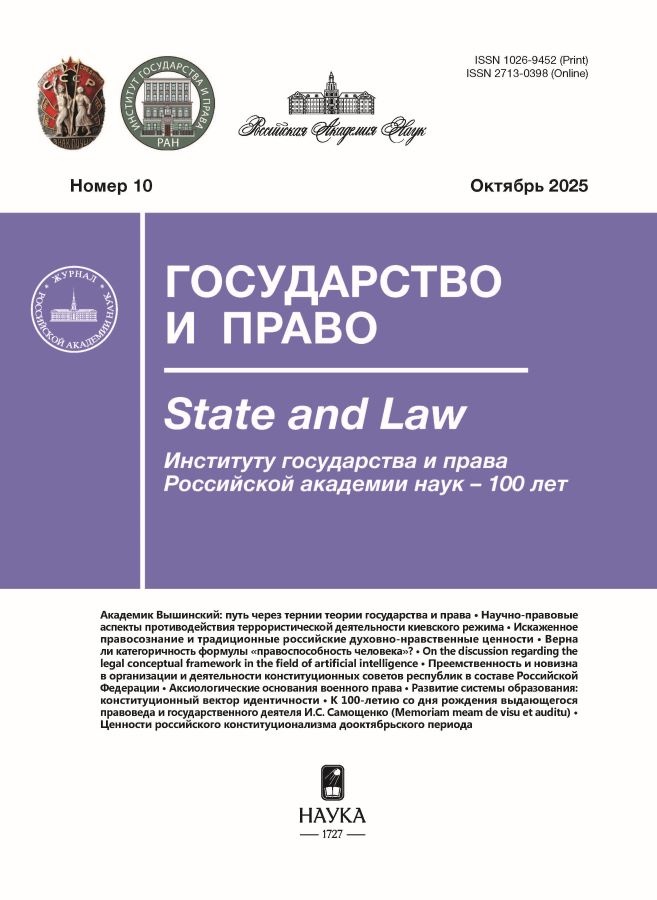Санкционный правовой режим банковской деятельности
- Авторы: Тарасенко О.А.1
-
Учреждения:
- Московский государственный юридический университет им. О. Е. Кутафина
- Выпуск: № 11 (2024)
- Страницы: 152–162
- Раздел: Бюджет, налоги, банки
- URL: https://journals.eco-vector.com/1026-9452/article/view/649057
- DOI: https://doi.org/10.31857/S1026945224110136
- ID: 649057
Цитировать
Полный текст
Аннотация
В статье представлен критический анализ современного состояния теории, законодательства и практики действия санкционного правового режима банковской деятельности. По результатам исследования аргументирована допустимость использования термина «санкции» для обозначения принудительных мер, вводимых отдельными государствами или их союзами в одностороннем порядке. Далее представлена дефиниция категории «санкционный правовой режим банковской деятельности». Санкции иностранных государств и их союзов в зависимости от их адресата и содержания дифференцированы на персональные (блокирующие или платежные), в отношении сектора государственных банков (финансовые), региональные (эмбарго Крыма) и страновые. Предложена классификация санкций в зависимости от характера юрисдикции на территориальные и экстерриториальные. Выявлены различия санкционной политики ЕС и США. Определены негативные последствия воздействия санкционного давления на банковскую систему России, заключающиеся в ограничении ее доступа к иностранным рынкам капитала, блокировании международных активов, разрушении платежной инфраструктуры, ограничении свободного обращения наличной валюты: евро и долларов. В завершении обоснована необходимость разработки концепции противодействия санкционному давлению в отношении национальной банковской системы и сформулированы ее основные постулаты.
Полный текст
Об авторах
Ольга Александровна Тарасенко
Московский государственный юридический университет им. О. Е. Кутафина
Автор, ответственный за переписку.
Email: olga201175@gmail.com
Доктор юридических наук, доцент, профессор кафедры предпринимательского и корпоративного права
Россия, 123995, Москва, ул. Садовая-Кудринская, 9.Список литературы
- Актуальные проблемы российского права: учеб. / отв. ред. И. В. Ершова. М., 2021. С. 212.
- Бахин С. В., Еременко И. Ю. Односторонние экономические «санкции» и международное право // Закон. 2017. № 11. С. 162–175.
- Лаутс Е. Б. Антикризисное законодательство и законодательство в сфере государственного регулирования предпринимательской деятельности // Юрист. 2017. № 15. С. 10.
- Пехтерева Е. А. Влияние санкций на банковский сектор России // Экономические и социальные проблемы России. 2016. № 2. С. 96.
- Тарасенко О. А. Предпринимательская активность Банка России // Актуальные проблемы росс. права. 2020. № 6. С. 81.
- Тарасенко О. А. Формирование доктрины и законодательства о правовых режимах банковской деятельности // Вестник Пермского ун-та. Юридические науки. 2021. Вып. 51. С. 105.
- Терентьева Л. В. Экстерриториальное проявление юрисдикции государства в условиях трансформации восприятия его государственных границ // Право. Журнал ВШЭ. 2019. № 3. С. 167.
- Тимофеев И. Н. Политика санкций Европейского союза. Опыт событийного анализа // Современная Европа. 2021. № 2. С. 17.
- Цечоев В. К., Швандерова А. Р. Теория государства и права: учеб. М., 2017. С. 202.
- Eckes C. EU restrictive measures against natural and legal persons: from counterterrorist to third country sanctions // Common Market Law Review. 2014. No. 51 (3). Pp. 869–905.
- Jazairy I. Report of the Special Rapporteur on the negative impact of unilateral coercive measures on the enjoyment of human rights. 2015. 10 August. Pp. 5–7.
- Johnston C. Sanctions against Russia: Evasion, compensation and overcompliance // European Union Institute for Security Studies. 2015. No. 5. P. 3.
- Welt C., Archick K., Nelson R. M., Rennack D. E. U. S. Sanctions on Russia: Congressional Research Service. 2020. P. 45.
Дополнительные файлы











